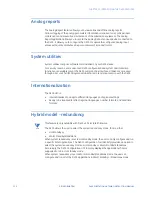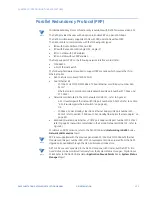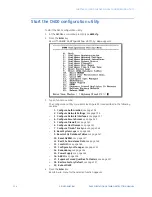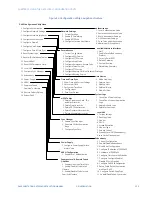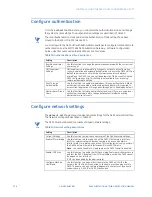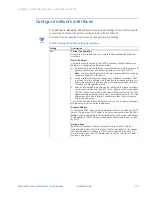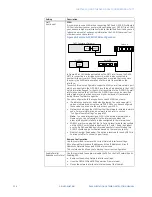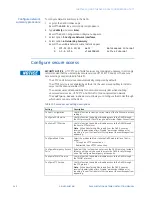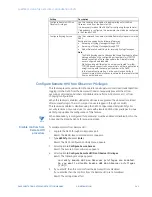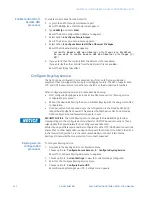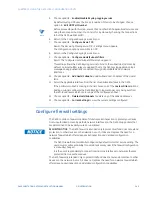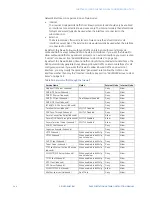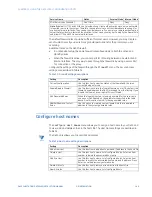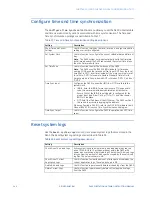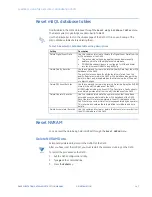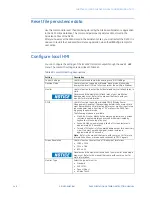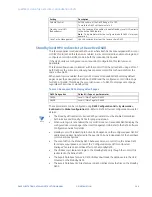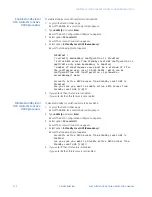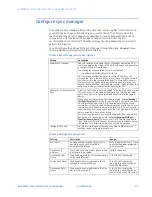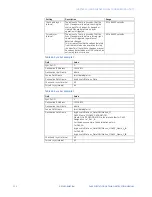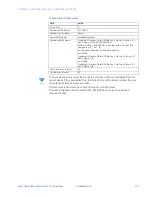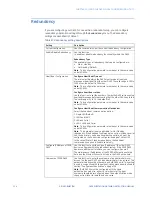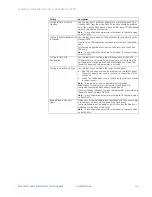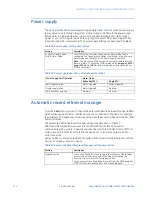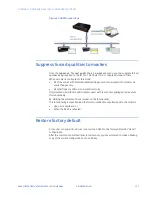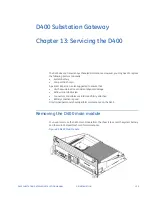
144
GE INFORMATION
D400 SUBSTATION GATEWAY INSTRUCTION MANUAL
CHAPTER 12: USING THE D400 LOCAL CONFIGURATION UTILITY
Network interfaces can operate in one of two modes:
•
Internal
The Internal mode permits traffic from known protocols and should only be enabled
on interfaces connected to known devices only. The Internal mode is the default mode
for Net1 and would typically be used when the interface is connected to the
substation LAN.
•
External
The External mode offers a stricter set of rules and is the default mode for all
interfaces except Net 1. The External mode would typically be used when the interface
is connected to a WAN.
By default, the firewall allows outbound traffic on internal interfaces and blocks all
outbound traffic except outbound SSH on external interfaces. If you want the firewall to
allow outbound traffic for a particular protocol on an external interface you must create a
“custom” rule. See section: “Add/Edit/Remove Custom Rules” on page 145.
By default, the firewall blocks inbound traffic on both internal and external interfaces. The
D400 automatically generates rules allowing inbound traffic on internal interfaces for all
configured services. If you want the firewall to allow inbound traffic on an external
interface, you may modify the associated “generated” rule to allow the traffic on ALL
interfaces rather than only the “Internal” interface. See section: “Add/Edit/Remove Custom
Rules” on page 145.
Table 34: Service traffic through the firewall
Service Name
Notes
External Mode Internal Mode
Modbus/TCP Server (Inbound)
Deny
Allow
DNP/UDP Server (Inbound)
Deny
Allow
DNP/TCP Server (Inbound)
Deny
Allow
DNP/TCP Client (Inbound)
Dual Endpoint Enabled
Deny
Allow
DNP/UDP Client (Inbound)
Deny
Allow
IEC 60870-5-104 Server (Inbound)
Deny
Allow
Terminal Server (Inbound)
SSL/TLS Disabled
Deny
Allow
DCA Pass-Through (Inbound)
SSL/TLS Disabled
Deny
Allow
Secure Connection Relay (Inbound)
Allow
Allow
Secure DCA Pass-Through (Inbound) SSL/TLS Enabled
Allow
Allow
Secure Terminal Server (Inbound)
SSL/TLS Enabled
Allow
Allow
SNMP Client (Inbound)
Deny
Allow
LogicLinx Executor (Inbound)
Deny
Allow
HTTP (Inbound)
When enabled in d400cfg
Deny
Allow
HTTPS (Inbound)
When enabled in d400cfg,
see note below
Deny
Allow
DHCP Client (Inbound)
When enabled in d400cfg
Deny
Allow
Telnet Server (Inbound)
When enabled in d400cfg
Deny
Allow
FTP Client/Server (Active & Passive,
Inbound)
When enabled in d400cfg
Deny
Allow
SSH/SFTP/SCP Server (Inbound)
When enabled in d400cfg,
see note below
Deny
Allow
TFTP Client (Inbound)
When enabled in d400cfg
Deny
Allow
NTP Client (Inbound)
When enabled in d400cfg
Deny
Allow
NTP Server (Inbound)
When enabled in d400cfg
Deny
Allow
SSH/SFTP/SCP (Outbound)
When enabled in d400cfg
Allow
Allow
All other services (Outbound)
Don't Care
Deny
Allow
Summary of Contents for Multilin D400
Page 12: ...12 GE INFORMATION D400 SUBSTATION GATEWAY INSTRUCTION MANUAL PRODUCT SUPPORT ...
Page 28: ...28 GE INFORMATION D400 SUBSTATION GATEWAY INSTRUCTION MANUAL CHAPTER 1 BEFORE YOU START ...
Page 34: ...34 GE INFORMATION D400 SUBSTATION GATEWAY INSTRUCTION MANUAL CHAPTER 2 INSTALLING THE D400 ...
Page 88: ...88 GE INFORMATION D400 SUBSTATION GATEWAY INSTRUCTION MANUAL CHAPTER 5 POWERING UP THE D400 ...
Page 174: ...174 GE INFORMATION D400 SUBSTATION GATEWAY INSTRUCTION MANUAL APPENDIX A STANDARDS PROTECTION ...
Page 184: ...184 GE INFORMATION D400 SUBSTATION GATEWAY INSTRUCTION MANUAL APPENDIX C LIST OF ACRONYMS ...
Page 192: ...192 GE INFORMATION D400 SUBSTATION GATEWAY INSTRUCTION MANUAL INDEX ...

